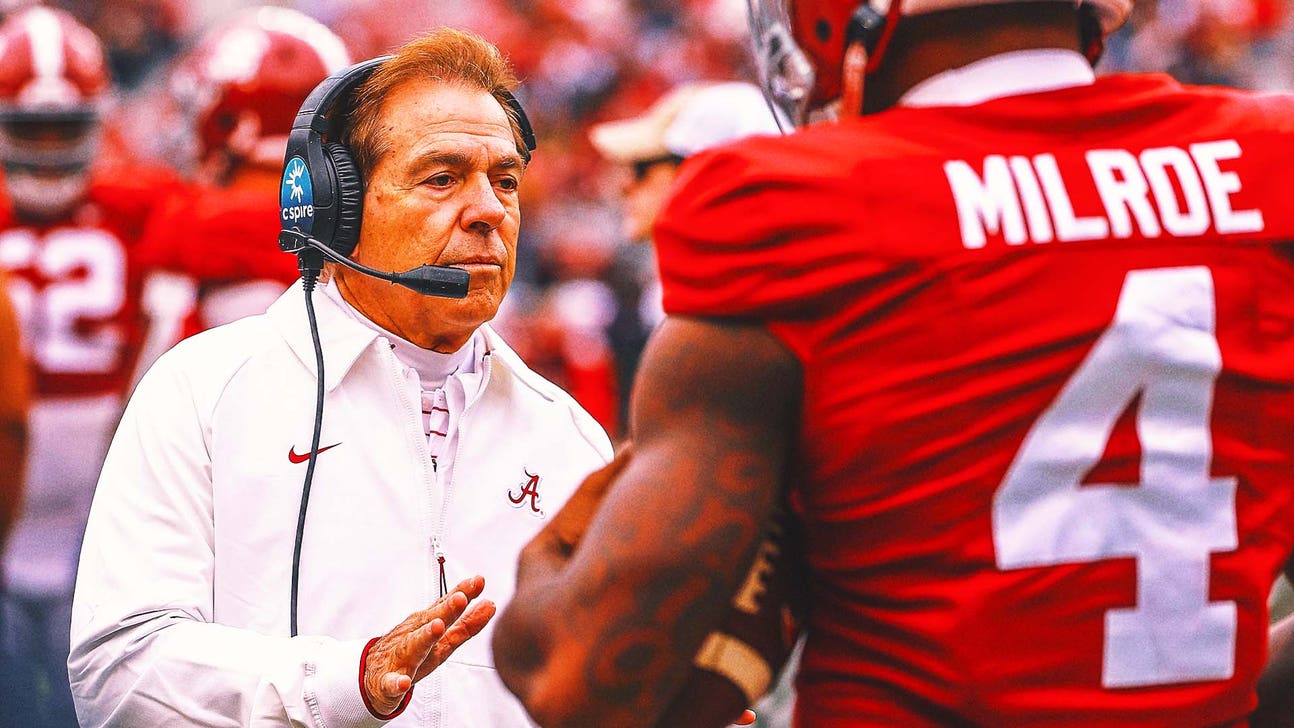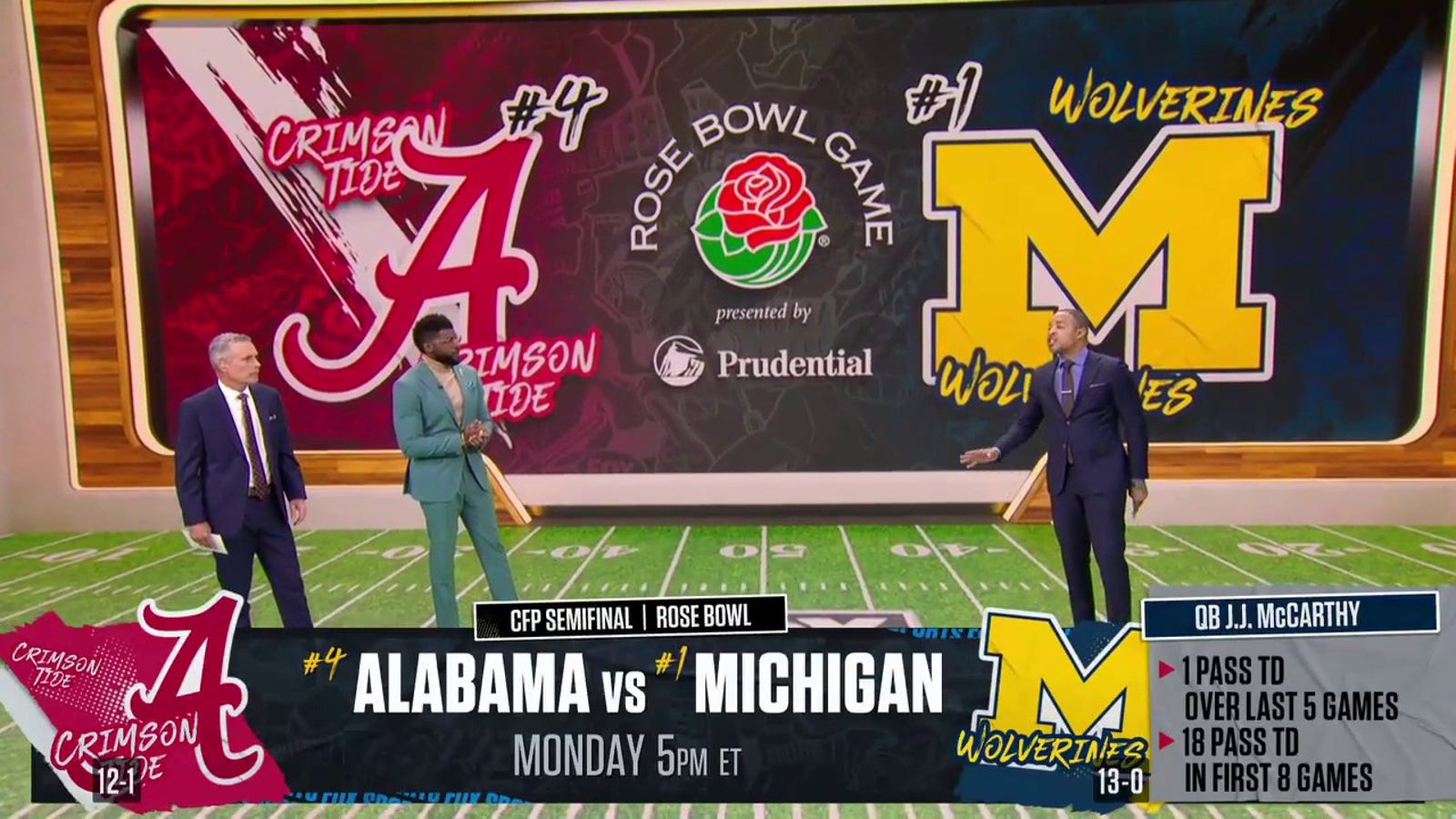
Is 'Connor Stalions Effect' real? Alabama makes changes ahead of Rose Bowl
LOS ANGELES — Throughout much of Nick Saban's historic run at Alabama, much has been made of "The Process" — the meticulous effort he puts into preparing his program for what needs to be done at every moment of the day, and how to do it.
Before games and after games, during the season and outside of it, from administrators to players on down, "The Process" reigns supreme in Tuscaloosa. Every person has a clearly defined role and is tasked with executing it at the highest level that Saban demands. It has been the backbone of the Tide's run to six national titles and eight appearances in the College Football Playoff, a common thread of success that has adapted to the sport's evolution, but remains omnipotent in its approach.
Until, it seems, this year's semifinal game against Michigan in the Rose Bowl.
The reason? You could probably chalk it up to the "Connor Stalions Effect" being very real.
That's because it seems that "The Process" was altered this week as a result of the sign-stealing scandal surrounding the Big Ten champion Wolverines this season, ever since the conference office and NCAA first revealed an investigation into the team's former staffer in late October.
Stalions, who was fired by Michigan in November, was a recruiting analyst with the program who allegedly bought tickets to upwards of 30 games as part of an elaborate scheme to steal the in-game signs used by Michigan's opponents.
According to multiple Alabama players who spoke to reporters on Thursday ahead of Monday's Rose Bowl, the change they are making is subtle but still notable given how loathe Saban is to modifying things during such a critical period. Whether it's a direct result of the Stalions scandal or a case of being overly careful given the stakes, the greatest coach in college football history appears to be taking no chances when it comes to preparing to play Jim Harbaugh & Co. on New Year's Day.
The change? Tide players are only being allowed to study film in groups this week, not on their individual iPads.
"Normally we change our signals if there's a coach on the coaching staff that's gone to another school. So changing signals is just like another game for us. We just have to adjust to it. We have new plays anyway, so there's always something to learn," receiver Isaiah Bond noted. "(Film study) is in a big team room, with the receivers just watching film. So, we still get the same amount of hours."
Although meeting together as a team or in position groups to watch film is not new — and indeed mostly standard practice across the sport — the fact that it is the only avenue for players to watch film this week is eyebrow-raising.
Typically, Tide players have been allowed to watch film on individual iPads on their own. But quarterback Jalen Milroe was the lone member of the Alabama contingent who spoke to the media on Thursday who acknowledged he was still doing so.
"The app we record film off ... I guess they were looking at other people's play calls, hand signals, stuff like that," Bond said when pressed for a reason as to the change.
Senior running back Jase McClellan, whose time in the program dates back to Alabama's run to the national title in 2020, noted that the order to not use individual iPads for film study is something different from past bowl trips under Saban.
Previewing Alabama vs. Michigan, Texas vs. Washington
"The preparation is kind of the same. We go in and study a team's tendencies and what they have," said McClellan. "It's kind of a change-up (to study in groups) because we do it every day as a whole, watching daily practice film. Now we have to study film (in groups), but it's pretty much the same.
"We don't get individual film. Only our coaches get it, so we just watch it with our coaches."
Saban did not speak on Thursday and mostly avoided the issue when addressing preparing for Michigan upon his arrival in Southern California.
Offensive coordinator Tommy Rees also failed to provide much insight into the decision when asked what prompted the departure from the standard routine.
"I'm not going to get into the whole film, sign stealing — that I'm not talking about," Rees said, alluding to the Stalions scandal, when asked why players were not being allowed to watch film individually. "Our job is to give our players the best chance to have success on the field. We're focused on what we're trying to do.
"It's not my area to talk up."
Will Alabama and Nick Saban topple Michigan and Jim Harbaugh?
It is Saban's, however, and even if the coach took the standard company line that it's not a big change, it still is out of the ordinary — for players, for coaches, and for everybody around the Tide.
Perhaps it won't matter one bit by the time kickoff rolls around on Monday afternoon, but it's certainly not nothing from a program which prides itself on being consistent.
So often during the past two decades, it's been Alabama that has forced teams to change their approach to big games. But based on actions — and not just words — it looks as though what has transpired in Ann Arbor throughout this season is still clearly reverberating around the sport, to the point where even a legend like Saban is taking note.
More than that, he's doing something about it, too.
Bryan Fischer is a college football writer for FOX Sports. He has been covering college athletics for nearly two decades at outlets such as NBC Sports, CBS Sports, Yahoo! Sports and NFL.com among others. Follow him on Twitter at @BryanDFischer.












